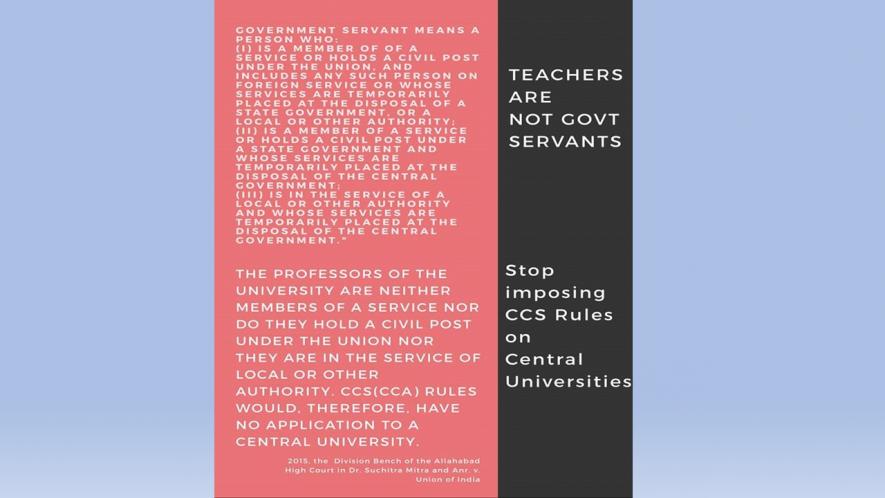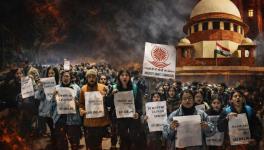Forcing CCS Rules on Central Varsities: Bad Governance, Bad in Law
The 'conduct' rules applicable to Central government bureaucracy will not only gag the critical faculties of teachers but are also legally and administratively fallacious.

Several opinions have been expressed by the Jawaharlal Nehru University (JNU) administration saying that teachers of central universities are at par with civil servants of the central government on the ground that since they are paid by the central government, they are automatically governed by the rules in place for central government officials.
This is a specious argument, if not a dangerous one, for the following reasons.
First, education is a public good. By “good”, I do not mean a tangible product which has an embedded value, but as a service which is an integral part of the constitutional duty of the state. Here the notion of the “public” is not a governance-related matter, or an act of administrative intervention, but a domain which is the public responsibility of the state.
Civil service, a.k.a the bureaucracy, does not constitute a public “good” because the service-orientation of the bureaucracy lies in implementing and executing the administrative policies of governments, plus playing a crucial role in the formulation of these executive decisions. Therefore, the proximity of civil service to the central executive mandates a certain set of “service conditions” which require fundamental safeguards like confidentiality and secrecy. These cannot be mandated for teachers because the act of teaching cannot pose a potential threat to the executive functioning of the State.
Second, salaries are remuneration for services provided; and if the nature of the services provided are different, a purportedly common source of salaries for both is irrelevant in the determination of “service conditions” of the two, precisely because the nature of services provided by the two categories is comprehensively different.
Third, the threshold requirements of the two services are also different. Not only are the “essential qualifications” to be eligible to be considered at the entry points of both these services separate, so are the internal rules and regulations governing systems of administration in the two sectors.
While a civil servant functions under the explicit control of government rules, central university teachers are covered by Acts of Parliament, plus their own statutes and ordinances which are different for each central university. This is so because the core assumption of such a diversity of Acts is the institutional autonomy and functional autonomy of such universities.
While the Central government continues to exercise supervisory and other forms of administrative oversight, the functional autonomy of universities is embodied in the institution of the University Grants Commission (UGC) which is empowered with statutory, regulatory and advisory authority over these universities. However, the UGC is also by its very Act mandated to protect and further the institutional and academic autonomy of universities over which it is given an ombudsman role.
These separate domains were accepted by the High Court of Allahabad in 2015, which clearly defined a `government servant’ as a person
(1) is a member of of a Service or holds a civil post under the Union, and includes any such person on foreign service or whose services are temporarily placed at the disposal of a State Government, or a local or other authority;
(2) is a member of a Service or holds a civil post under a State Government and whose services are temporarily placed at the disposal of the Central Government;
(3) is in the service of a local or other authority and whose services are temporarily placed at the disposal of the Central Government."
The court soundly concluded that `professors of the University are neither members of a service nor do they hold a civil post under the Union nor they are in the service of local or other authority. CCS (CCA) Rules would, therefore, have no application to a Central university.
Therefore, whether CCS (central civil service (conduct) rules) rules will gag the teachers' critical faculties or not is a separate issue and we teachers have all rights to be agitated about that; but what is more directly relevant are the administrative and legal fallacies behind this move.
This intervention is unacceptable because it is both bad governance and bad in law.
(The writer is Professor, Centre for Historical Studies, Jawaharlal Nehru University, Delhi)
Get the latest reports & analysis with people's perspective on Protests, movements & deep analytical videos, discussions of the current affairs in your Telegram app. Subscribe to NewsClick's Telegram channel & get Real-Time updates on stories, as they get published on our website.























